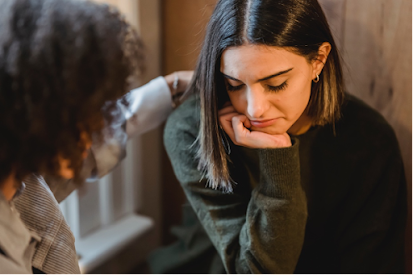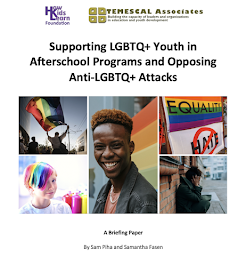 |
| Source: www.pexels.com |
We know that many young people suffer from grief and the loss of loved ones due to COVID, gun violence, etc. In response we have posted several LIAS blogs, a briefing paper and webinar trainings for the afterschool community.
Guest blogger, Vicki Zakrzewski, Education Director for Greater Good Science Center, recently interviewed pediatrician, Dr. David Schonfeld on addressing young people‘s grief in school settings. Below she shares a few excerpts from her interview. (To read the full interview, click here.)
Zakrzewski: What is the difference between trauma and grief?
Schonfeld: We’ve tried so hard to be trauma-informed that we often forget to also be grief-sensitive. When you’re dealing with trauma, you’re helping people deal with something that happened. When you’re dealing with grief, you’re trying to support them as they face the loss of someone or something important to them. The interventions are very different. And trauma is not intrinsically more important than grief.
Some assume that trauma is more important or serious than grief because it’s been talked about more among mental health professionals. Reactions that are due to trauma are labeled symptoms and may lead to the diagnosis of trauma disorders, and then we recognize the need for mental health treatment from licensed and credentialed professionals. But since bereavement is considered a normative life experience and not a mental illness, even the same reactions aren’t viewed as an illness, and we don’t provide treatment for grief. Instead, we offer support delivered by lay people or faith-based professionals. It’s generally free since most health insurances won’t pay for grief support.
 |
| Source: Artwork by Lauren Coakley. Added by Temescal Associates |
Zakrzewski: What advice would you give to education professionals who are not sure how to respond to grief and loss?
Schonfeld: I think we need to acknowledge that it’s OK to be uncomfortable with grief, but that sometimes you have to do things you’re uncomfortable with when they’re important. A lot of times people will share with me this “secret” that it’s hard for them. I tell them that that’s a given.
We just have to acknowledge that this is really tough and it’s all right to feel some discomfort. It’s all right to recognize that you don’t know exactly what to say or how to do it—but it’s not all right to not do anything.
A lot of people think that because they don’t know what to say to a grieving student, it’s better to say nothing. Nothing is exactly the wrong thing to say. It communicates to kids and adults that you’re clueless, you don’t care, you don’t think they can handle it, you can’t handle it, or you don’t want to waste your time. Those are all really horrible messages for people in crisis. So we try to give school professionals basic skills to support students and staff after crisis and loss—but acknowledge that it’s still hard. We let them know that we’re going to help them do it.
“After my brother died, life was so hard to live. There were days that I sat there and I didn’t think I could live anymore without my brother. Whenever a birthday, holiday or special occasion would come along, I would always end up shedding at least a few tears. Nothing was the same without my brother.” —Jeniffer, 16, Children’s Grief Awareness Day (Note: added by Temescal Associates)
Zakrzewski: What kind of support do teachers and students say helps them the most?
Schonfeld: For the education professionals, the common advice given is about self-care. But organizational approaches can be more effective than personal self-care alone. However, you really need both. If we imply that if you are upset when you have an upsetting job it’s because you’re not professional enough and didn’t do enough to take care of yourself, we risk blaming the professional for stress that is inherent in the work. We have to disavow that from the beginning, and instead do our best to establish organizational support structures and minimize the stress associated with the positions and create an organizational culture that values staff support.
I think for a lot of kids, figure out what type of academic and, to some degree, social support to offer, and then be there to listen to them. Be present and empathic, and that’s probably a large part of what an educator has to do.
Zakrzewski: How do you suggest schools respond to the range of cultural approaches to grief within their respective communities?
Schonfeld: Death is a universal experience, and we should focus more on how it’s the same and less on how it can be manifested in different ways. There’s a tendency for us to feel uncomfortable supporting people of other backgrounds. Start with one culture, maybe your own. If you know how to support a grieving student in that culture, you can do it with students of any culture—you just have to realize that there are differences.
It’s not important that you learn everything about different cultures. Instead, ask them, “Could you help me understand what’s important to you and your family, so I can better understand how to help you?” I’ve never had a family say, “I’m not going to tell you.” They want to share their beliefs and their culture so you can better help them.
After a presentation, people will often come up to me and say, “I said the wrong things.” And I reassure them that even though the advice I gave sounds easy, I’ve made the same mistakes. As long as people know you care and are trying to help them, they’re pretty open to forgiving you. They’re less likely to do so if you appear disinterested or insensitive.
MORE ABOUT…
Vicki Zakrzewski, Ph.D., is a former teacher and school administrator, and the founding education director at the Greater Good Science Center, where she translates the science of compassion, empathy, gratitude, awe, forgiveness, and other social, emotional, and ethical skills to improve the well-being of students and educators. She writes articles, gives talks and workshops all over the world, designs online courses for educators, and is the creative lead for the GGSC’s new online resource for educators, Greater Good in Education. Vicki also serves as the co-associate editor of SEL practice for Social and Emotional Learning: Research, Practice, and Policy, sits on several advisory boards, and consults and collaborates with educational organizations.
David J Schonfeld, MD, Fellow of the American Academy of Pediatrics (FAAP), is a developmental-behavioral pediatrician; he founded and directs the National Center for School Crisis and Bereavement at Children's Hospital Los Angeles. Dr. Schonfeld is Professor of Clinical Pediatrics at Keck School of Medicine. His recently published book is entitled, The Grieving Student: A Guide for Schools and it can be ordered here.
To see additional tools to ensure a sense of safety for all youth, see our Youth Development Guide 2.0 here. Also, a new briefing paper on supporting LGBTQ youth. Feel free to share this resource with your network.









No comments:
Post a Comment